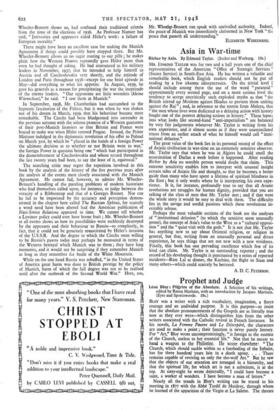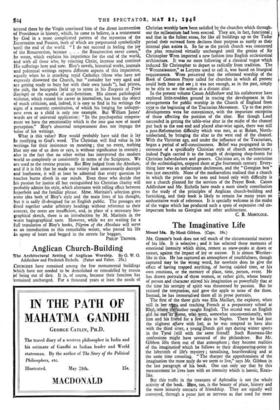Prophet and Judge
Leon Bloy : Pilgrim of the Absolute. A Selection of his writings, edited by Raissa Maritain, with an introduction by Jacques Maritain. (Eyre and Spottiswoode. 18s.)
BLOT was a writer with a rich vocabulary, imagination, a fierce courage and an undivided purpose. It is this purpose—to insist that the absolute pronouncements of the Gospels are as literally true now as they ever were—which distinguishes him from the other writers associated with the Catholic revival in French literature. In his novels, La Femme Pauvre and Le Desespere, the characters are used to make a point ; their function is never purely literary. For "Art," Bloy wrote uncompromisingly, "is foreign to the essence of the Church, useless to her essential life." Not that he meant to hand a weapon to the Philistine. He wrote elsewhere: "The
Church, which should suckle within us a foreboding of the Infinite, has for three hundred years lain in a death agony. . . . There remains capable of reviving us only the she-wolf Art." But he saw that the objects of our attention are arranged in a hierarchy, and that the spiritual life, for which art is not a substitute, is at the top. At sixty-eight he wrote dejectedly, " I could have become a saint, a worker of wonders. I have become a man of letters."
Nearly all the trends in Bloy's writing can be traced to his meeting in 1877 with the Abbe Tardif de Moidrey, through whom he learned of the apparition of the Virgin at La Salem. The threats
tittered there by the Virgin convinced him of the direct intervention of Providence in history, which, he came to believe, is a restatement by God in a more complicated pattern of the mysteries of the incarnation and Passion, both of which are perpetuated symbolically until the end of the world. " I do not succeed in feeling the joy of the Resurrection, because . . . the Resurrection never comes," he wrote, which explains his impatience for the end of the world, and with all those who, by rejecting Christ, increase and continue His sufferings here and now. Bloy's novels, historical works, journals and polemical writings express different aspects of this impatience, equally when he is attacking tepid Catholics (those who have not expressly disowned the Church, but " consider her very aged and are getting ready to bury her with their own hands "), bad priests, the rich, the bourgeois (held up to scorn in his Exegesis of Trite Sayings) or the scandal of anti-Semitism. His almost pathological violence, which ruined his career in journalism, has been the object of much criticism, and, indeed, it is easy to find in his writings the signs of a neurotic constitution, of which his longing for unhappi- ness even as a child is only one example. But William James' words are of universal application: " In the psychopathic tempera- ment we have the emotionality which is the sine qua non of moral perception." Bloy's abnormal temperament does not impugn the value of his writings.
What is this value? Bloy would probably have said that it lay In testifying to God's word. The Christian will find value in his !writings for their insistence on meaning ; that no event, nothing 'that any one of us does or says, is without significance in eternity ; also in the fact that no other writer has interpreted the modern world so completely or consistently in terms of the Scriptures. We are used to the reverse process. But Bloy judged from the Absolute, and if it is felt that he made our society look unnecessarily decrepit and loathsome, it will at least be admitted that every question he touches burns afresh in our minds. Even those who decide that his passion for justice all but extinguished his Christian charity will probably admire his style, which alternates with telling effect between hyperbole and the familiar phrase. Mme. Maritain's selection gives some idea both of Bloy's style and the main lines of his thought, but it is sadly ill-designed for an English public. The passages are fitted together under arbitrary headings without reference to their context, the notes are insufficient, and, in place of a necessary bio- graphical sketch, there is an introduction by M. Maritain in the worst hagiographical taste. However, while we are waiting for a full translation of Bloy's books, Pilgrim of the Absolute will serve as an introduction to this remarkable writer, who passed his life in agony of heart and begged in the streets for beggars.
PHILIP TROWER.



































 Previous page
Previous page